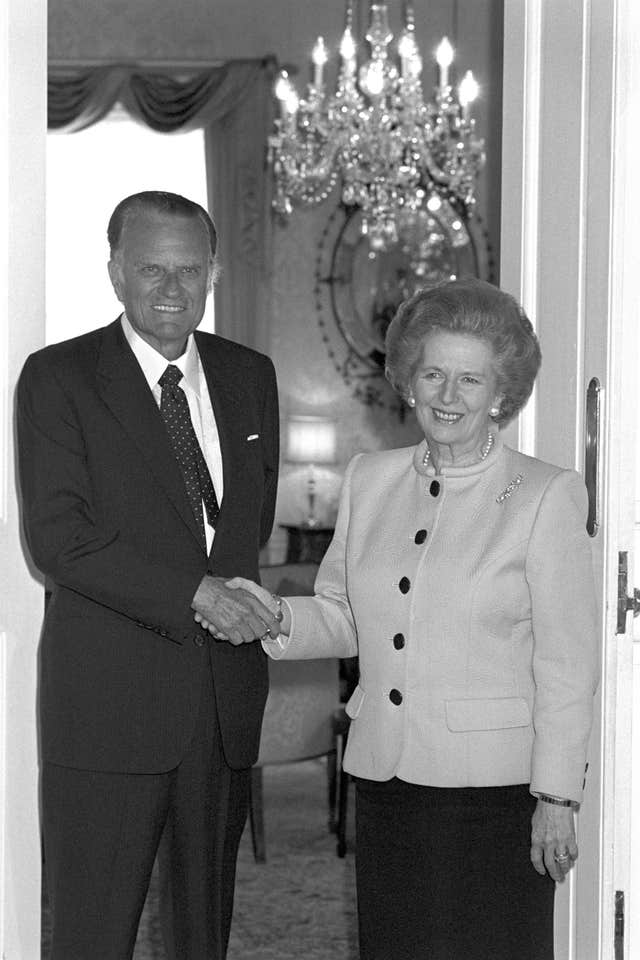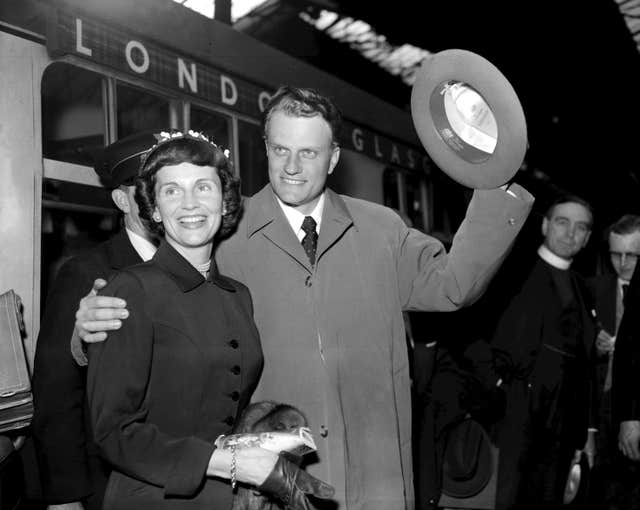
The Rev Billy Graham, who transformed American religious life through his preaching and activism, has died at the age of 99.
Mr Graham, who had been suffering from cancer, pneumonia and a number of other illnesses, was a counsellor to American presidents and travelled the globe to become perhaps the most widely heard Christian evangelist in history – with a number of successful appearances in the UK.
Spokesman Mark DeMoss said Mr Graham died at his home in North Carolina on Wednesday morning.
The GREAT Billy Graham is dead. There was nobody like him! He will be missed by Christians and all religions. A very special man.
— Donald J. Trump (@realDonaldTrump) February 21, 2018
US president Donald Trump tweeted: “The GREAT Billy Graham is dead. There was nobody like him! He will be missed by Christians and all religions. A very special man.”
Former American presidents also paid tribute to the preacher. Barack Obama said: “Billy Graham was a humble servant who prayed for so many — and who, with wisdom and grace, gave hope and guidance to generations of Americans.”
George HW Bush, the 41st US president, said: “Billy Graham was America’s pastor. His faith in Christ and his totally honest evangelical spirit inspired people across the country and around the world. I think Billy touched the hearts of not only Christians, but people of all faiths, because he was such a good man.

“I was privileged to have him as a personal friend. He was a mentor to several of my children, including the former president of the United States (George W Bush). We will miss our good friend forever.”
Jimmy Carter said: “Tirelessly spreading a message of fellowship and hope, he shaped the spiritual lives of tens of millions of people worldwide. Broad-minded, forgiving, and humble in his treatment of others, he exemplified the life of Jesus Christ by constantly reaching out for opportunities to serve.”
Mr Graham reached more than 200 million people through his appearances and millions more through his pioneering use of television and radio.
Unlike many traditional evangelists, he abandoned narrow fundamentalism to engage broader society.

More than anyone else, Mr Graham built evangelicalism into a force that rivalled liberal Protestantism and Roman Catholicism in the US.
His leadership summits and crusades in more than 185 countries and territories forged powerful global links among conservative Christians, and threw a lifeline to believers in the communist-controlled Eastern bloc.
Dubbed “America’s pastor”, he was a confidant to US presidents from Dwight Eisenhower to George W Bush.

In 1983, Ronald Reagan gave Mr Graham the Presidential Medal of Freedom, America’s highest civilian honour. When the Billy Graham Museum and Library was dedicated in 2007 in Charlotte, former presidents George HW Bush, Jimmy Carter and Bill Clinton attended.
Beyond Mr Graham’s public appearances, he reached untold millions through his pioneering use of prime-time telecasts, network radio, daily newspaper columns, evangelistic feature films and satellite TV broadcasts. Mr Graham’s message was not complex or unique, yet he preached with a conviction that won over audiences worldwide.
By his final crusade in 2005 in New York City, he had preached in person to more than 210 million people worldwide. No evangelist is expected to have his level of influence again.

“William Franklin Graham Jr can safely be regarded as the best who ever lived at what he did,” said William Martin, author of the biography A Prophet With Honour.
In his early days as a preacher, he stood out for his loud ties and suits, as well as a rapid delivery and swinging arms that won him the nickname “the Preaching Windmill”.
A 1949 Los Angeles revival turned Mr Graham into evangelism’s rising star. Held in a tent dubbed the “Canvas Cathedral”, Mr Graham had been drawing adequate, but not spectacular crowds until one night when reporters and photographers descended. When Mr Graham asked them why they had come, a reporter said that legendary publisher William Randolph Hearst had ordered his papers to hype the preacher.
The publicity gave him a national profile. Over the next decade, his massive crusades in the UK and New York catapulted him to international celebrity. His 12-week London campaign in 1954 defied expectations, drawing more than two million people.

Three years later, he held a crusade in New York’s Madison Square Garden that was so popular it was extended from six to 16 weeks, capped off with a rally in Times Square that packed Broadway with more than 100,000 people.
Mr Graham was criticised for being too moderate when it came to the civil rights movement. However, he ended racially segregated seating at his Southern crusades in 1953, a year before the US supreme court’s school integration ruling, and long refused to visit South Africa during the apartheid era.
His wife, Ruth, died in 2007 aged 87. They have five children: Franklin – who now runs his ministry – Virginia, Anne, Ruth and Nelson.


Comments: Our rules
We want our comments to be a lively and valuable part of our community - a place where readers can debate and engage with the most important local issues. The ability to comment on our stories is a privilege, not a right, however, and that privilege may be withdrawn if it is abused or misused.
Please report any comments that break our rules.
Read the rules here